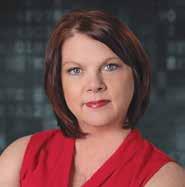
4 minute read
From the Editor: Embracing Others in My New Year's Resolutions
January 2024
Shira Firestone, Editor CJN
I love a clean, new calendar. Its crisp pages, free from coffee stains and the wear of being carted around in my bag, are not yet overwhelmed with appointments either to dread or look forward to. They hold an emptiness that suggests spaciousness and potential. That is something I can only get with paper calendars. My computer calendar, unchanging in appearance from one day, month, or year to the next, doesn’t inspire that same sense of possibility.
As we put away the remnants of New Year’s Eve festivities and equip ourselves with fresh 2024 calendars, many of us embark on the annual ritual of setting resolutions — or, for some, adamantly swearing them off. New Year’s resolutions have gotten a bad rap, perhaps because we’re all too familiar with the resolution merry-go-round: we make resolutions, only to abandon them, adding a layer of failure to our initial self-critique. No wonder so many want nothing to do with this time-honored ritual.
Yet, I find something remarkably powerful in following cycles and engaging in rituals designed to support introspection, growth, and change. Over the years, however, I’ve become more conscious in identifying changes that align with my core values and what I truly want, rather than focusing on what I want to be rid of – the parts of myself I reject. Too often our resolutions are rooted in shame and self-criticism. I’ve written before, here and elsewhere, that focusing on what I perceive to be “wrong” with me or my situations is not how I want to enter the energies of a new year. I don’t want to lose weight – I want vibrant health and energy. I don’t want to be out of debt — I want financial security and freedom from worry. It’s not about deprivation or ridding myself of anything; it’s about stepping more fully into a different, more positive vision for myself.
For me, this process of identifying changes begins with the Jewish New Year, when I tend toward a more spiritual self-evaluation, continues through my fall birthday with a more corporal reflection, and culminates with the secular new year when I am ready to make plans and take action. And of course at Passover, I get to look at my mitzrayim, where I’ve gotten stuck, and recommit to action. This approach works for me.
Yet, this year I had a new insight as I engaged in my annual ritual. Despite the careful considerations with which I crafted my intentions, I recognized they were primarily focused on self. This realization doesn’t undermine the importance of self-reflection and setting personal goals; such practices are fundamental to growth. However, the events of last year, both in my own life and in our wider community, have gently nudged me to broaden my perspective. I’m prompted to extend my attention beyond the personal, embracing others in my vision for the future.
It’s an insight I had through observing the compassionate actions of others, particularly in the latter part of 2023. In the wake of the October 7 attacks, I witnessed and experienced remarkable acts of individual kindness. Of course, in the same time period, I experienced the exact opposite. And in that pain, I was reminded of the axiom that the best way to move through suffering and pain is by being of service to others. It’s the cornerstone of most of the world’s great philosophies and spiritual traditions. Judaism, places a high value on gemilut chasadim (acts of loving kindness). Performing deeds of kindness is considered one of the highest virtues, and it’s believed that helping others can elevate both the giver and the receiver, easing personal struggles and fostering a sense of communal well-being.
So I begin 2024 by adding another element to my ritual. In addition to clarifying my vision for what I want to see for myself, I am embracing others in that vision. What is the highest good I can see for them? And, as with any well-crafted resolutions, what actions will I take to help create that highest vision, to best serve others?
I put pen to paper and made some decisions, ensuring my plans resonate with my values and circumstances. My resolutions this year are not just about self-improvement; they are commitments to being a more active listener, to reaching out regularly to specific individuals, and to sharing my skills and knowledge in meaningful, one-on-one interactions, among others.
In weaving acts of service and connection into my plans, my calendar transforms from a mere keeper of dates into a roadmap for a year where personal growth and communal care come together. It’s a vision for a year of shared kindness and collective hope, a journey of enriching not just my own life but also the lives of those around me.”
Happy New Year!










